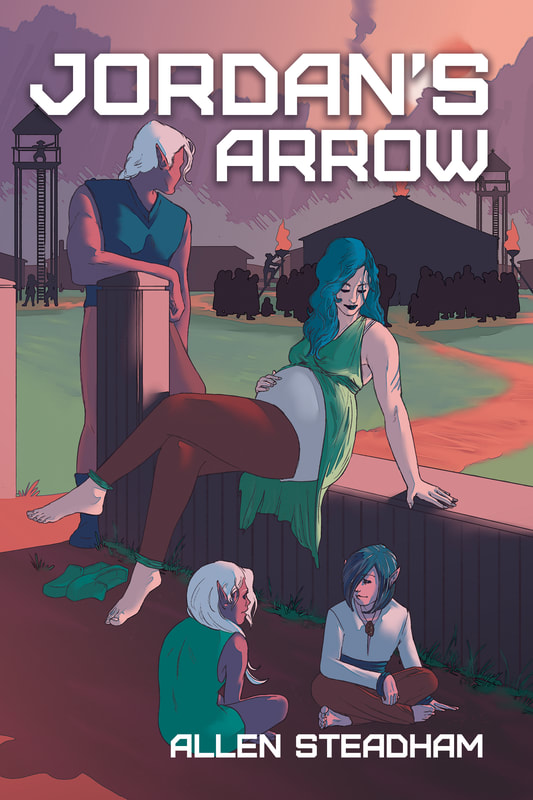|
Ilsketh Jartaf did not choose to be the leader of the Gulstaa. A daughter among eight other male siblings, she was the only one born with the Clansign, a long red birthmark on her pale-yellow right cheek, roughly the shape of a scythe’s blade. She was taken by members of the Ruling Council to be educated and trained when Ilsketh reached the age of four. Her parents were well-compensated for their sacrifice.
The rulers, governing factions, and warriors lived separate from the rest of the Gulstaa. They resided in a harsher, more difficult to reach region named Kamethla. It was there that the Ruling Council devised elaborate strategies while the warriors forged their strength and increased their prowess in the art of battle. Ilsketh spent most of her childhood in Kamethla. As future leader, she had to learn the thousand cycle history of the Gulstaa and their many laws. She also was required to sit in on tactical sessions with the Council. Furthermore, she was expected to become a military leader and the fiercest warrior among their people. As a result, Ilsketh went through more stringent mental and physical training than anyone else. For fifteen years, she endured a punishing schedule which began before daylight and went well into each evening. She held the title of Heng Da or “High One” in the Gulstaa language — but absolutely no disobedience was tolerated. Any signs of rebellion were quashed immediately. And under the guidance of the Ruling Council and the Warrior General, Ilsketh was molded into a tempered, perfect sword: their beloved future leader. Outside of the Ruling Council itself, she was the most powerful person in the region. One morning, as she was finishing some stretches, a scout ran towards the village, his feet kicking up pebbles, dirt, and snow as he approached. His uniform was torn and disheveled from the long trek. Intrigued, Ilsketh walked towards the front gate, her dark brown bangs blowing into her eyes by the icy winds. Observing the scout’s short, lean stature and bald head, he appeared to be in his late twenties to mid-thirties. In contrast, while the back of Ilsketh’s hair was short, even severe, it was shorn in line patterns demarking her position. She was tall for a Gulstaa, reaching about six feet, athletic but trim. She had grown accustomed to seeing the dark yellow circles beneath her incredibly sharp eyes, which were the color of lavender. In front of her, the short and thin scout was panting, clearly exhausted from traveling far. His bulging eyes declared his fear, haunted and unsure. The imposingly strong guards helped him remain on his feet and catch his breath. “The battle — did not go well,” the scout gasped. “The Leader took four squads . . . but it wasn’t enough!” “What happened?” one guard demanded. “The Leader fell . . . so did most of the squads,” the scout lamented. “Only a few warriors made it back . . . to tell of the battle before taking Final Sacrifice. The last of them sent me.” The guards nodded with dire certainty. “You did well. We will alert the Ruling Council,” one guard told the scout. “Thank you. I request Final Sacrifice,” the scout said, eyes lowered. Only warriors could perform the task, either for themselves or anyone else. “For your service, I will grant your request,” the guard landed a killing strike with his sword. The scout fell to the ground, relief frozen on his face. Both guards gave a slight bow. “I will go inform the Ruling Council,” one guard said. “When I return, perform the death rites for the scout.” “It will be done,” his counterpart acknowledged. Ilsketh saluted the guard as he neared her. He returned the gesture. “Heng Da?” the guard asked. “I will accompany you,” she said. “Yes, Heng Da.” ... The Ruling Council was in a state of chaos that Ilsketh had never witnessed before. She sat in the Council Chamber, a circular hall hundreds of cycles old, built with large gray stones and having wooden pillars throughout. At the center of the room was a long, wide and sturdy table crafted from the same rock as the walls. A bright fixture resembling a timbered, candle-lit chandelier was suspended from the ceiling. Fresh air permeated from two small bay windows, one on the eastern wall as well as its opposite. Normally reserved and deliberate, the eighteen members were loudly arguing with each other, following the news delivered by the guard. Most seemed to be in shock while others were clearly vying to increase their own political power. Anger and disgust rose from within Ilsketh. She went and grabbed the ceremonial war hammer from its honorary place on the northern wall. She took its hilt firmly in both hands and slammed it into the middle of the ancient stone deliberation table. “ENOUGH!” she screamed. “I will have order in this room!” She succeeded in getting everyone’s attention. They turned and faced her, stunned by her audacity and display of authority. However, she was Heng Da. Legally, she was the only one with the right to command them, especially now. But they had not expected her to do so. “I know I have seen only nineteen cycles and have much to learn,” she growled, pacing the room like a cat, occasionally looking at various council members. “But even I know that now is not the time to fall apart.” “Heng Da is wise!” That voice belonged to Segim Artol, the Chief of the Ruling Council, an elder who had presided since before Ilsketh’s birth. Tall and stout, he appeared astute but weary — and perhaps wary as well. His hair was long, gray, and well-groomed. Like the rest of the Council, he wore a midnight blue robe and ornamental jewelry made of local crystals and refined metals. Ilsketh looked at him with contempt but kept her speech respectful. “Who were we fighting?” she said. “The Mountain Mokta,” Segim replied. “I had heard that the Mokta were good fighters,” Ilsketh affirmed. “Did our people die well?” “Their Chieftess offered them the chance for peace, to retreat.” Ilsketh made a low murmuring sound, her expression twisting into one of disgust. “That is not our way,” she demurred coldly. “Yes, Heng Da. Our people fought to the last warrior, including the Leader.” “Good.” Ilsketh knew Segim was not one to miss an opportunity and was clearly still upset by the Heng Da embarrassing the Council. He cleared his throat and looked her in the eyes expectantly. “You are now Leader, Heng Da. What shall we do?” Segim asked. “Do?” Ilsketh repeated. “I will explain. Should your people punish these Mokta for their arrogance or should we set our sights on new territories?” His tone had been splendidly reverent but Ilsketh had participated in enough Council meetings to see the trap he had laid for her. Fortunately, she had anticipated his actions before entering the chamber and devised a plan of her own. “The Mokta acted within the confines of their laws and traditions; they were not arrogant,” she uttered slowly, even defiantly. “However, I will not let our people — and our former Leader — go unavenged. In the Early Days, did we not learn from the example of Daltath? Her father, Kintosh, surrendered four provinces to the Wendana to wage peace. The Wendana returned a cycle later and attempted to take all of the Gulstaa lands. “But Daltath, also born with the Clansign, slew Kintosh and took command. Her cunning and savagery not only repelled the invaders but she spent the rest of her life hunting them down. Now there are no more Wendana. Daltath taught us that surrender is never an option. So, do not ask me if I will act in a way that sounds or looks like surrender. If I ignore what the Mokta did, it says we are weak and invites them to attack us, to believe they can conquer us. Obviously, that is not so!” It was sickening to see Segim smile at her. Did he believe he had snared her? They both knew a battle now would not go well. The warriors would still be demoralized by the death of the previous Leader. They also would not have much good will or rapport built with Ilsketh. Following this path would force her to rely on the Council more. It would increase Segim’s influence over her future decisions. And Ilsketh would not be so easily manipulated. “But now is not the time for renewed conflict,” Ilsketh continued, addressing the entire Council and making eye contact with each member as she turned. “We will bury our dead and heal from this loss. We will grow our forces and properly prepare for battle. I will show you that your efforts in training me have not been in vain. We will attack in overwhelming numbers from all sides, striking down their defenses and use their own people as hostages. When we take the Mokta Mountain, it will be they who surrender — or die!” Segim’s expression burned with indignation at the ease with which Ilsketh had evaded him. She had actually turned the situation to her advantage. Her words were met with praise and thunderous applause from the Council. Not only that, but she knew her plan was sound. She could tell he knew that too. And he was not happy about it.
0 Comments
Leave a Reply. |
About the authorAllen Steadham is a nondenominational Christian. Happily interracially married since 1995 and the proud father of two sons and a daughter. He and his wife have been in the same Christian band since 1997. He plays electric bass, she plays strings, they both sing. It's all good. The Allen Steadham Newsletter!Signup to get the latest news and updates. Get a FREE Sci-Fi short story just for subscribing below! Thank you!You have successfully joined our subscriber list. Archives
July 2024
Categories |



 RSS Feed
RSS Feed